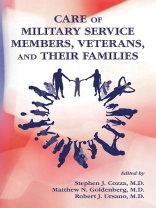Care of Military Service Members, Veterans, and Their Families serves a critical need, which has been highlighted by recent reported rates of combat-related stress disorders and traumatic brain injury, as well as increases in suicide rates among service members and veterans over the past decade and the distress and challenges faced by their children and families. More than 2.5 million Americans currently serve in the U.S. military on active duty, in the Reserves, or in the National Guard, and more than 20 million civilians are veterans. Although patients are viewed here in the context of military service, they seek health care in military, veteran, and civilian settings, and their mental health concerns are as diverse as those encountered in the civilian population. This book is designed for clinicians in all care settings and provides thorough coverage of U.S. military structures and cultures across the armed services, as well as detailed material on the particular mental health challenges faced by service members and their families.
A full overview of the military lifestyle is provided, including the life cycle of the military (recruitment to retirement), service subcultures (Navy, Army, Marines, Air Force, and Reserve and Guard components), challenges of military life for service members and families (moves, deployments, etc.), and military mental health. Material on military culture provides insight for practitioners who may not be familiar with this population. The book focuses on collaborative care, particularly between the military health care system and the Veterans Administration, providing clinicians with strategies to mitigate stigma and other barriers to care through mental health service delivery in primary care settings. The incidence of traumatic brain injury among service members has increased because of the use of improvised explosive devices, and an entire chapter is devoted to diagnosing and treating these injuries as well as educating patients and their families on the condition. The families of service members face significant challenges, and several chapters are devoted to the needs of military children, the families of ill and injured service members and veterans, deployment-related care, and caring for the bereaved.
The book’s comprehensive review of resources available to military service members, veterans, and families both ensures high-quality care and reduces the workload for treating physicians. Care of Military Service Members, Veterans, and Their Families is an authoritative and much-needed addition to the mental health literature.
Daftar Isi
Contributors Dedication Preface Acknowledgments PART I: Fundamentals for Treating Military Service Members, Veterans, and Familieschapter 1. An Introduction to Military Servicechapter 2. Understanding Military Families: Their Characteristics, Strengths, and Challenges chapter 3. Military Children and Programs That Meet Their Needschapter 4. Military Health Care System and the U.S. Department of Veterans Affairs: An Overview PART II: Military Service–Related Conditions and Interventionschapter 5. Health Consequences of Military Service and Combatchapter 6. Combat Stress Reactions and Psychiatric Disorders After Deploymentchapter 7. Substance Use Disorderschapter 8. Care of Combat-Injured Service Memberschapter 9. Traumatic Brain Injurychapter 10. Suicidal Thoughts and Behaviors in Military Service Members and Veteranschapter 11. Collaborative Care: Mitigating Stigma and Other Barriers to Care Through Mental Health Service Delivery in Primary Care Settings PART III: Meeting the Needs of Military and Veteran Children and Familieschapter 12. Deployment-Related Care for Military Children and Familieschapter 13. Children and Families of Ill and Injured Service Members and Veteranschapter 14. Caring for Bereaved Military Family Memberschapter 15. Building Resilience in Military Families Index
Tentang Penulis
Stephen J. Cozza, M.D., is a professor of psychiatry and associate director of the Center for the Study of Traumatic Stress at the Uniformed Services University of the Health Sciences in Bethesda, Maryland.Matthew N. Goldenberg, M.D., is a professor of psychiatry at the Uniformed Services University of the Health Sciences in Bethesda, Maryland.Robert J. Ursano, M.D., is director of the Center for the Study of Traumatic Stress, a professor of psychiatry and neuroscience, and chair of the Department of Psychiatry at the Uniformed Services University of the Health Sciences in Bethesda, Maryland.












